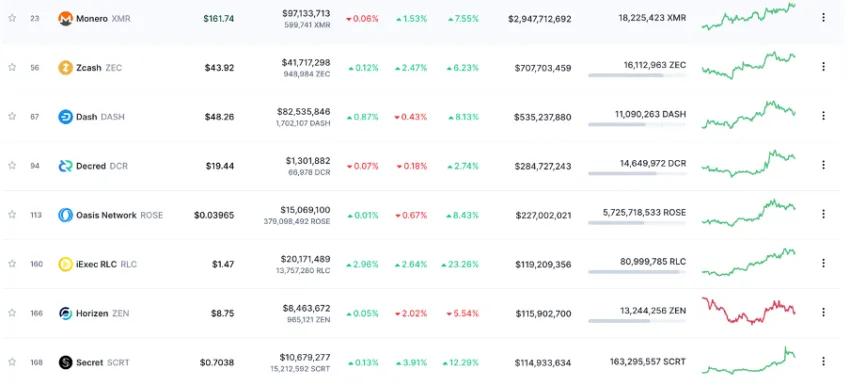Blockchain Privacy Group shares concerns with US Congress
A blockchain group of more than 30 members shared an open letter addressed to the incoming new members of the US Congress. The letter advocated for regulations that protect privacy and support privacy-focused cryptocurrencies.
Privacy is a basic human right. A right that is increasingly being attacked by the powers that be. Nowhere is this more acute than when it comes to one’s finances. Governments, bankers and criminals can gather a lot of information about someone if they know what you own and buy.
Bitcoin, the largest cryptocurrency by market, is not entirely private. And while you may not know the identity of a given Bitcoin address, it is possible to analyze certain aspects. How much does it hold, how long do they hold said funds, has it interacted with other addresses, and can transactions be traced to specific exchanges?
Cryptocurrency and privacy
All of this can be easily found through blockchain auditing tools that help someone paint a picture of a Bitcoin address’s interactions. Most blockchains are public and immutable, meaning that once a transaction is sent and timestamped, it cannot be changed.
This feature is important to the Bitcoin blockchain to ensure that the transactions of all participants are true and verifiable. However, this comes at the cost of complete privacy.
Initially, many people using the Bitcoin network were not too concerned with this aspect; they used Bitcoin as if it were completely private.

Back in the days of the Silk Road, Bitcoin was used just like that. Some users even sent these funds directly to switch accounts in their names, and when someone can attach a real identity to a Bitcoin address, they know whose door to knock on.
This is where privacy coins such as Monero (XMR), Zcash (ZEC) and Dash (DASH) found their niche.
Keep privacy intact
Given the rise in bad actors, regulators look set to enforce know-your-customer statutes on every crypto wallet, and the importance of privacy coins is becoming increasingly apparent. A report published in 2020 by law firm Perkins Coie called ‘Anti-Money Laundering Regulation of Privacy-Enabling Cryptocurrencies’ addresses these issues.
The report highlighted key areas regarding privacy coins, including the need to protect privacy rights. Due to their regulatory uncertainty, crypto institutions have largely shied away from dealing much with privacy coins. Despite this, Grayscale Investments filed for a Monero Trust despite heavy criticism from lawmakers.
Many other crypto VCs have poured hundreds of millions of dollars into other privacy-oriented cryptocurrencies. This was also the case with the Secret Network in 2022. Last year, Digital Currency Group (parent company of Grayscale) CEO Barry Silbert put significant support behind this sector.
Privacy coins have been controversial since their creation, primarily due to their association with illegal activity and features that allow them to circumvent financial regulations.
The Organization for Economic Co-operation and Development (OECD) could potentially prevent the rise of privacy coins under new tax measures in 2023. In addition, the US and EU could also set up roadblocks for privacy coins due to money laundering concerns.
A draft law coming out of the EU even proposes to ban privacy coins:
“Credit institutions, financial institutions and crypto-asset service providers shall be prohibited from holding … anonymity-enhancing coins.”
If passed, this would ban people from owning cryptocurrencies such as Monero (XMR) and Zcash (ZEC), Dash (DASH), Decred (DCR), Firo (formerly Zcoin), Verge (XVG), and Horizon (ZEN), among others second.

Taking a stand against regulators
Faced with moves by regulators, blockchain groups have joined together in rebellion against the movement. In a report shared with BeInCrypto, digital advocacy group Fight for the Future wrote an open letter to the upcoming new members of the US Congress. This group includes players such as Blockchain Association, DeFi Education Fund, Ledger, Nillion Network and Protocol Labs.
The report sheds further light on privacy coins, saying:
“Tools like Signal, Firefox, Tor and Filecoin (as well as projects running on zero-knowledge proofs like Zcash or MobileCoin) are an illustration of the robust digital future you should be promoting: ensuring privacy, security, access to knowledge and Freedom of Expression does not continue to undermined by Big Tech’s perverse financial incentives or bad policies.”
This follows the “clumsy, misguided legislative and regulatory actions” that are placing obstacles to prevent innovations in the cryptocurrency and privacy coin sectors. The letter urged lawmakers to protect privacy rights, champion end-to-end encryption and protect personal data. It further called for “working to identify and correct power imbalances.”
BeInCrypto contacted one of the participating groups, Electric Coin Co. (ECC), for more insight into the movement. Paul Brignerthe head of US Policy and Strategic Advocacy at ECC, told BeInCrypto:
“Zcash and the related technologies we’re building to preserve user privacy are critical to empowering individuals around the world to have financial freedom.”
At press time, the letter has a total of 36 signatures, with several blockchain-focused groups joining the movement.
Disclaimer
All information on our website is published in good faith and for general information purposes only. Any action the reader takes on the information contained on our website is strictly at their own risk.


